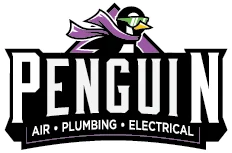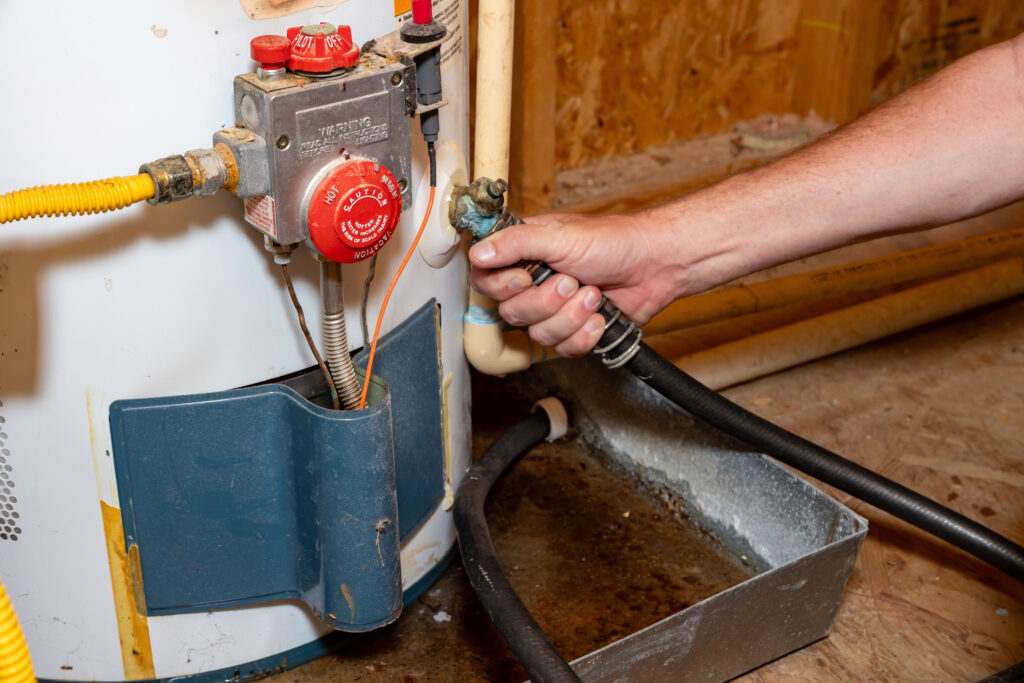Few things are more concerning than discovering a water leak around your water heater — especially if it’s not being used. Water heater leaks can indicate many different underlying issues that require immediate attention. Ignoring these leaks could lead to extensive water damage and more costly repairs down the road.
In this blog post, the plumbing professionals at Penguin discuss what you should do when you discover a water heater leak, the common causes of a leaking system, and why prompt repair is essential.
What To Do if Your Water Heater Is Leaking
The moment you notice a water heater leak, it’s important to take swift action to mitigate water damage. Here’s what to do:
- Turn off the power and water supply: Immediately switch off the power supply to your water heater. If it’s an electric system, turn off the breaker at your electrical panel. For gas water heaters, switch the gas valve to the “off” position. Then, shut off the water supply to the tank by turning the valve at the top of the heater clockwise.
- Clean up any water on the ground: Mop up any standing water around the water heater to prevent water damage and reduce the risk of slipping.
- Call a plumber for help: Contact a professional plumber to assess the situation and make necessary repairs. Water heater leaks can sometimes signal significant issues that need expert attention.
Common Causes of Water Heater Leaks
Water heater leaks may arise for a variety of reasons, the most common of which include:
Corroded Tanks
Over time, sediment buildup and age can lead to corrosion inside the tank. This can create weak spots that eventually cause leaks. If your water heater is old and showing signs of rust, it may be time to replace it.
Faulty Temperature & Pressure Relief Valve
The T&P valve is designed to release water when the tank’s pressure becomes too high. If this valve malfunctions or gets stuck, it can leak even when the tank isn’t in use. Addressing this promptly is critical to avoid pressure buildup that can lead to more severe issues.
Loose Drain Valve
The drain valve at the bottom of the water heater can become loose or damaged, leading to leaks. This is often a straightforward fix but should be checked by a professional to ensure there are no other underlying issues.
Cracked Tank
If the tank cracks due to old age or a defect, water seeps out and creates a consistent leak. Cracks are a serious issue that generally requires a complete water heater replacement.
High Water Pressure
Excessive water pressure can cause strain on the water heater, leading to leaks in various areas, such as the connections or fittings. Ensuring the water pressure in your home is regulated can help prevent this.
Why Prompt Water Heater Repairs Are Important
Fixing a leaking water heater promptly is vital to avoid further complications. Even a small leak can cause significant water damage. The longer water seeps out, the more extensive the damage will be.
Leaving leaks to fester can also result in more serious issues, such as tank failures or mold growth. Leaks related to failing T&P valves or high pressure can be dangerous, causing tank explosions when systems can’t effectively release excess pressure.
Choose Penguin for Water Heater Repairs in Phoenix, AZ
If your water heater is leaking, don’t wait to get the fast, effective repairs you need. Penguin is proud to offer expert water heater repair services in Phoenix, providing 24/7 emergency responses backed by an unparalleled commitment to quality service.
Schedule water heater repairs in Phoenix by contacting our team online today.

